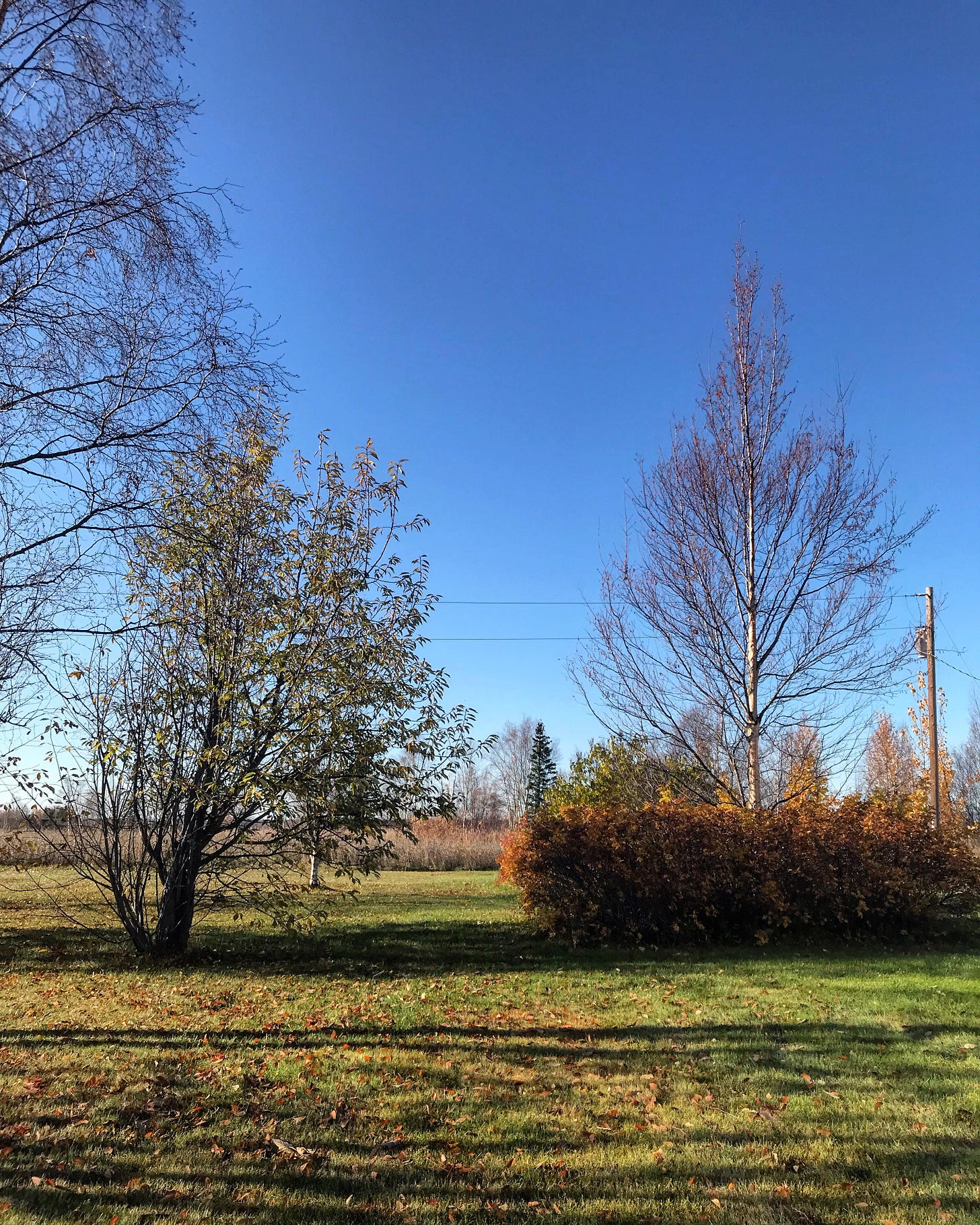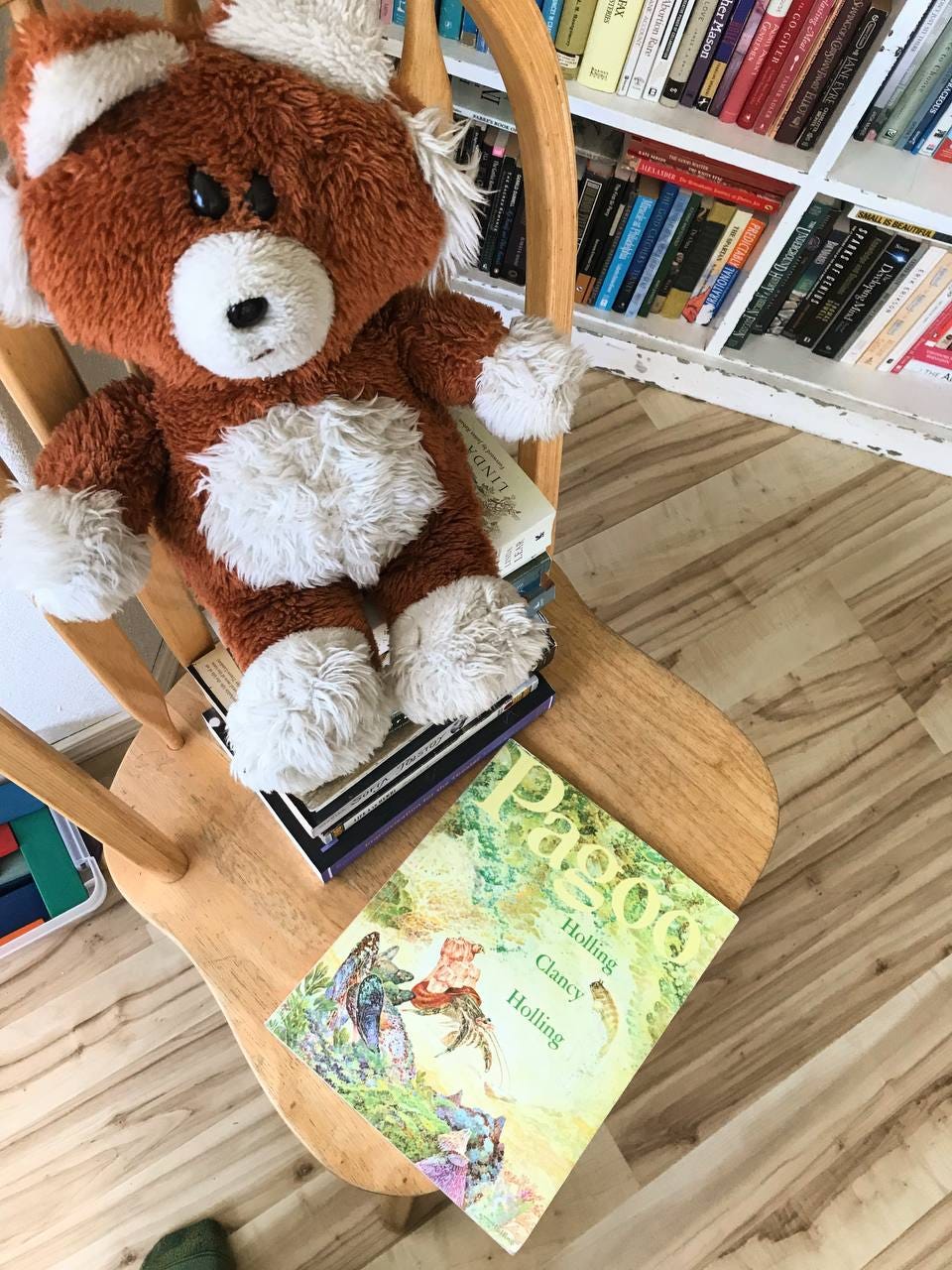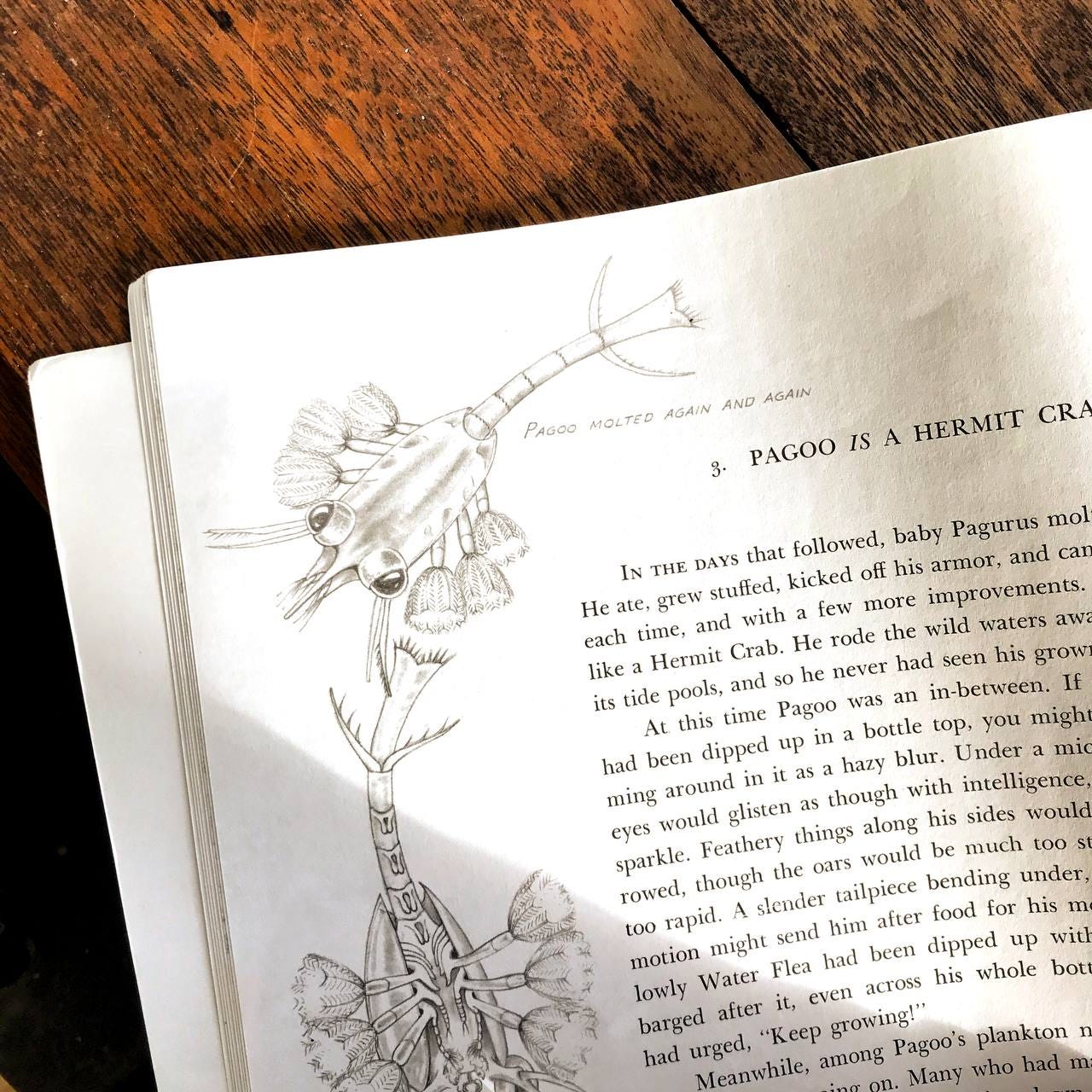holding on and letting go
let's talk about grief & aging
Kav pads into our room at 6 am and he wants to snuggle. His arms are chilly and that’s probably why he woke up; it’s colder at night now but he kicks the covers off his bed. So this adorable skinny four-year-old with his cold hands and toes just wants to climb into our bed where it’s warm. You can’t blame him.
But I know the drill. If I let him, no one’s going to sleep past six. The sky is still black and we go back upstairs to his room, his own bed, back under the blankets that were dumped on the floor sometime in the middle of the night. We’re still getting over a cold so we take turns blowing our noses and I read a few articles on my phone. The sky is getting light, and one of the young roosters starts crowing.
I’ve never been a morning person but I know why people love it: It’s fresh, and fleeting. Like these little guys who grow so fast, from cuddling to driving cars, suddenly they’re taller than your husband and talking about moving out as soon as they turn eighteen.
I’m so glad we had these unexpected boys. Daily I am grateful for the chance to keep doing this in my forties – to try again, to do better, to walk more gently and hug more often. Twenty years of parenting later, so many things are different, but being able to carry new wisdom into timeless situations is a gift.
So much is changing and I need some things to be the same. I need four-year-old humor and eight-year-old genius, and to see big sisters hugging little brothers. We can’t stop time but we can stretch out the memories into longer generations, I guess.
This stuff is on my mind because it’s easier to think of all the time ahead with these younger ones than it is to accept the rapidly shrinking time left with the older ones.
And I mean the older kids, of course, but if I’m really honest I also mean my grandma, who has been changing and drifting and slipping for years. And when I think about it, I grieve. I don’t know what to do and I don’t want to think about the loss and change and pain, so I usually...just...don’t.
We used to have the best conversations almost every week. She’d call late at night, or I’d call her after I put the kids to bed, and she was up late anyway so we had time to catch up on everything. But over the last couple years we only talk about once a month at the most, and it’s so hard. Painful. Everything is different but there’s nothing to catch up on – she doesn’t remember anything that’s happening with us, and she says nothing ever changes for her. And she probably doesn’t remember that I called, anyway.
Hello grief, old friend. This is the new normal after (and often during) our conversations, and I know when I’m dialing the number that I will end up in quiet tears, covered with an artificially loud, cheerful voice because she can’t hear well, either.
“The kids are well, I take it?” she asks for the third time. Then a minute later, the fourth time.
She often asks about our oldest two, who she remembers the most even though she’s only seen Vincent a couple times in the last five years. And I remember this with my other grandparents, too – I was the oldest grandchild and they remembered me on the phone even though they didn’t recognize me in person. The last time I saw Grandpa, it took a minute and some explaining for recognition to dawn. So it makes sense that Grandma still asks about our oldest, and forgets the others. I don’t know if she remembers Kav and Finn’s names, even.
Maybe it’s my fault. We should’ve been there more. I wanted to be there at least once a month when we started working from home, and it worked for most of the first year until I had a baby. But then that baby hated car rides, and I had a bunch of health issues, and then the plandemic happened, and by the time that was over everything was different. She was different. Her vision was almost gone – and not just her physical vision, but her spiritual vision, her memory, and much of who she used to be.
Is that really true, though? Or am I just seeing this through the selfish, needy eyes of the kid who has always depended on her? Maybe (probably) she sees me as different, too – unknown, or unknowable. Too busy, with a life and lifestyle that’s too distant and unfamiliar.
She asks about the kids’ school but she can’t hear my answer. We both keep trying and it’s cringe-worthy in its increasingly loud repetition; she says my phone is staticky and I shush the boys from raking Legos and I stop trying to scoop barley out of the container for dinner. She still can’t hear me, so I turn off the stove and move to the boys’ room, then to their closet, and that’s a little better.
She keeps asking about homeschool, and if I didn’t know better – because she was also a homeschooling mom, 35 years ago – I’d think she was interrogating me.
“Who gives the kids their grades?” she asks. “Who decides when they move on to the next level?”
“I do,” I tell her. And she seems surprised but satisfied about that.
“Well, it’s different from when I homeschooled, I guess,” she says. “I homeschooled Mark...just Mark...not you.” I can’t tell if she’s talking to me or to my uncle Michael, who’s probably in the living room.
She says she’s glad I called, though. I am too, sort of. But still, I don’t know what to do with this change.
And the Lord gently holds that statement up to me and confronts me with it. I grew up often feeling that if something was wrong, it was my fault and therefore it was also my responsibility to do something about. That wasn’t Grandma’s fault, but it is the reason she’s the main maternal figure in my 46 years of life.
So part of this grief is realizing that my role as a woman needing a mother is changing again...and it’s not just changing, but finally diminishing to the point of disappearance. It’s not something I need to fix or make better; it’s something I need to accept and walk through gracefully.
It makes me think of a friend of ours who lost four father figures in the last year – his father, his father-in-law, and two close mentors – and he realized that he is now the father figure, fulfilling that role for so many younger than him.
I was reading Pagoo to the kids a little while ago. It’s probably my fourth time through the book and it’s a good science read, about a hermit crab’s journey through life from microscopic speck through adulthood. Pagoo molts and changes several times, and some of those times he doesn’t even recognize himself because the changes are so drastic, and this section today struck me:
“He still didn’t look like a Hermit Crab. He rode the wild waters away from the coast and its tide pools, and so he never had seen his grown-up relations.”
He had no idea what he was growing into or what he was supposed to look like as he molted through all these changes.
And we usually don’t, either.
Maybe it’s because I’m still in this nebulous realm between books, not knowing what I’m supposed to be when I grow up (I feel a bit like the absent-minded professor, desperate for the guidance and structure of a new project) that I’m reevaluating All The Things: What is my mission? What am I still passionate about, and what have I let go of – and do those things reflect how the Lord is leading me, or are they something else...like exhaustion? Because grief and transitions are exhausting.
Who decides when we get to the next level? He does.
In this transition, I’m trying to figure out what to hold on to and what to let go of. I’m going back to His promises, and old prophetic words, and clinging to the things that I know are true.
And also, I’m learning in new ways how to rest and trust Him, because I don’t want to lose my vision, too.
Another book I’m reading is Better Eyesight Without Glasses (yes, I read books like that, I’m super fun at parties) and I’m only about a quarter of the way through but one of the main points so far is that strain and stress is harmful to our vision (duh) and it goes so far as saying:
“The eye with normal sight never tries to see….whenever the eye tries to see, it ceases to have normal vision.”
And here, the Lord is preaching to me about not striving, not forcing a thing to happen, not taking responsibility for something that is not my job to fix. Not that we don’t pray or intercede or care, but that we also rest and step back and trust, and know He is in the midst of our situations and doing things beyond what we can see.
I don’t have a lot of answers yet...I expect that’s what the next few posts will be about. :) But I appreciate you reading, and wondering, and growing alongside me as we all walk through these new stages together. I’d love to hear how you are navigating these days, too.
Praying for you,
Shannon
P.S. Links for you!
Want to make kombucha? Here’s a great article on it that will help you get started.
How divided is America — and why does it matter, and what can we do about it? Great post here from Mr. Guerra.
Memorizing scripture is powerful! Here’s a tip that might make it easier.
Did you see my guest post at Raising Arrows? It’s on post-adoption depression which I absolutely did NOT want to write about, especially after writing a whole book on it...but we can do hard things. So I did. It’s a super vulnerable post and I hope it blesses you.
Interested in alternatives to traditional cancer treatment? Here’s an amazing testimony. And if you’re looking for a book on that topic, I just finished World Without Cancer by G. Edward Griffin this month and highly recommend it.
Homeschoolers! Looking for a way to make science fun? Vin initiated Science Goes Boom with our kids a few years ago and has been sharing the links online for a while, but he just moved it to its own Substack. It’s super cool – tell your friends, but maybe not your insurance agency.





Loved your post. Thinking of you guys all the time. 💕💕🙏